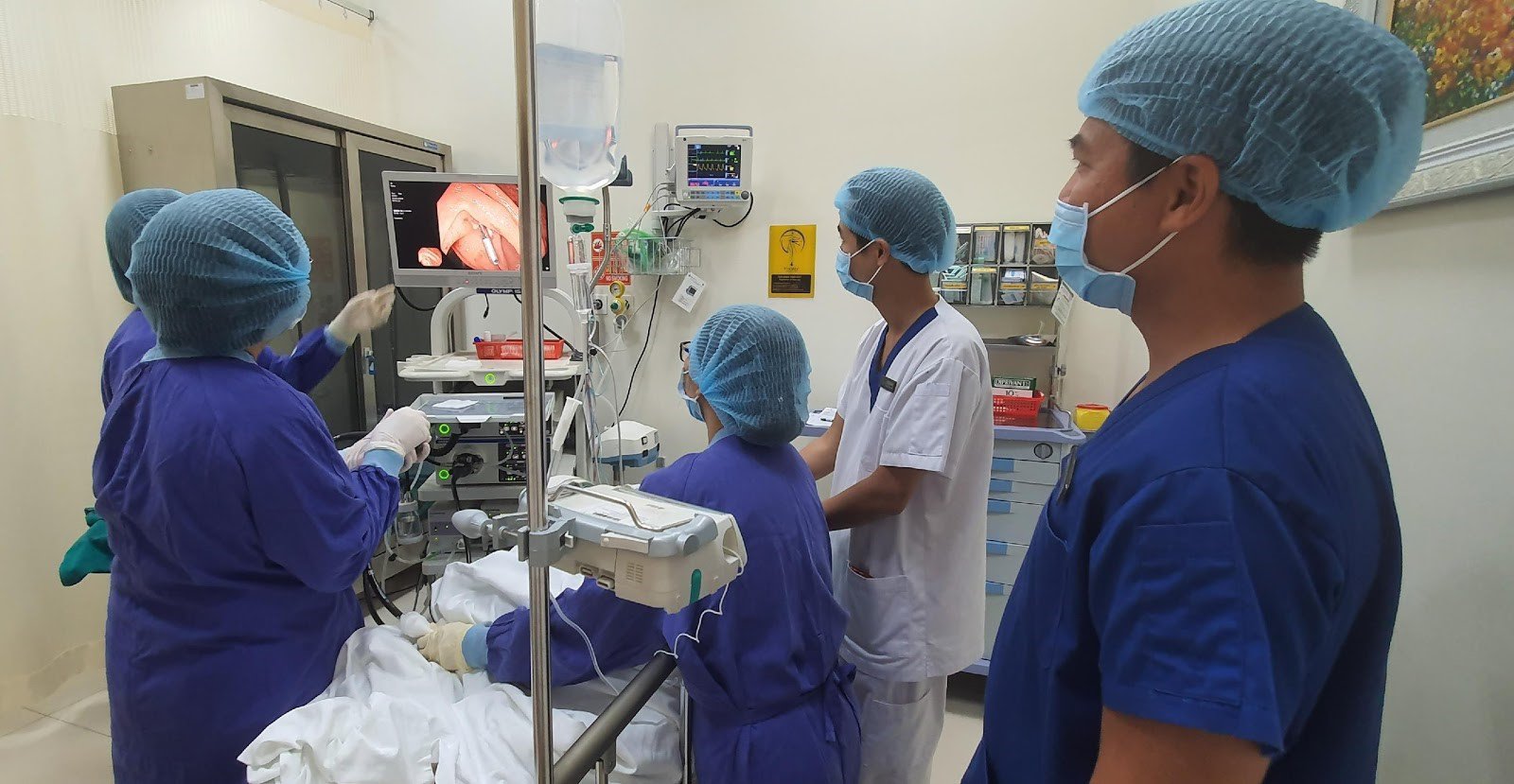Should gastric and colonoscopy at the same time be sedated?
The article was professionally consulted by Specialist Doctor I Tran Thi Anh Hien - Anesthesiologist - Anesthesiologist - Department of Surgical Anesthesia - Vinmec Central Park International Hospital
Gastrointestinal endoscopy is a procedure that directly examines the lining of the gastrointestinal tract (esophagus, stomach, duodenum, and rectum) by inserting a flexible endoscope into the digestive tract to detect lesions in order to obtain a diagnosis. necessary treatment.
1. What endoscopic techniques are available?
The most common gastrointestinal endoscopy is gastroscopy (insertion of a flexible tube through the mouth) and colonoscopy (insertion of a flexible tube through the anus).
Currently, gastrointestinal endoscopy techniques include the following 2 methods:
Normal gastrointestinal endoscopy: Patients are endoscopy after local anesthesia, so they may feel pain, nausea and discomfort. like during endoscopy. Therefore, some people have refused to perform, missing the opportunity to detect and treat the disease at an early stage. Gastrointestinal endoscopy with anesthesia: The patient is endoscopy after sleeping with sedation.
Currently, gastrointestinal endoscopy techniques include the following 2 methods:
Normal gastrointestinal endoscopy: Patients are endoscopy after local anesthesia, so they may feel pain, nausea and discomfort. like during endoscopy. Therefore, some people have refused to perform, missing the opportunity to detect and treat the disease at an early stage. Gastrointestinal endoscopy with anesthesia: The patient is endoscopy after sleeping with sedation.

Với phương pháp này, bệnh nhân không bị đau- kích thích - khó chịu trong khi nội soi. Nội soi gây mê là bước tiến vượt bậc trong lĩnh vực nội soi tiêu hóa.
2. Advantages of endoscopic anesthesia
Helps to reduce pain - nausea - discomfort - anxiety of patients during endoscopy compared to conventional endoscopic methods. Safety: Anesthesiologist will calculate the appropriate dose of intravenous sedative for each patient. The colonoscopy will take place like a nap for about 15-30 minutes. After the endoscopy, the patient gradually regained consciousness after about 5-10 minutes. The anesthetic time is short, the amount of anesthetic is small, so it does not affect health. Precise: The painless endoscopic method gives clearer and more accurate images because the patient lies still during the endoscopy, applying many techniques that need high accuracy such as: polyp removal, hemostatic injection Static ligation. Esophageal vascular disease in gastrointestinal bleeding Biopsies for pathologic diagnosis of gastrointestinal cancer and Helicobacter pylori (HP) Fast implementation: shortening time compared with conventional endoscopic methods
3. Should gastroscopy and colonoscopy be performed at the same time?
Gastroscopy and colonoscopy can be performed at the same time to avoid the need for double anesthesia. Gastroscopy and colonoscopy at the same time do not increase complications, however, the anesthetic time will be about 10-20 minutes longer (compared to gastroscopy or colonoscopy alone), but the total time Anesthesia time is shorter than with single endoscopy. In addition, when performing gastroscopy and colonoscopy at the same time, the patient enjoys the hospital's preferential price policy
4. What are the possible risks when gastrointestinal endoscopy is anesthetized?

Trước khi gây mê, bệnh nhân thông báo với bác sĩ tiền sử dị ứng thuốc và các loại thuốc đang dùng
Gastrointestinal endoscopy is a safe procedure. However, complications can occur with a very low rate, including:
Aspiration of food or gastric juice into the lungs: patients need to fast for the recommended time to minimize this risk. . Drug allergy: rarely, the patient needs to inform the anesthesiologist the history of drug allergy and the drugs the patient is taking. Respiratory complications: breathing disturbances, hypoventilation. Adequate oxygen should be provided and the patient's respiratory status should be monitored during endoscopy. Cardiovascular complications: bradycardia rate < 5%. Tachycardia or extrasystoles rarely have severe hemodynamic effects, and most often resolve spontaneously.
Aspiration of food or gastric juice into the lungs: patients need to fast for the recommended time to minimize this risk. . Drug allergy: rarely, the patient needs to inform the anesthesiologist the history of drug allergy and the drugs the patient is taking. Respiratory complications: breathing disturbances, hypoventilation. Adequate oxygen should be provided and the patient's respiratory status should be monitored during endoscopy. Cardiovascular complications: bradycardia rate < 5%. Tachycardia or extrasystoles rarely have severe hemodynamic effects, and most often resolve spontaneously.
5. What should the patient prepare before gastrointestinal endoscopy?
Patients will have a pre-anaesthesia examination before the procedure. Gastroscopy with anesthesia: patients need to fast for at least 6 hours and fast for at least 2 hours before the endoscopy, do not drink any foods containing alcohol. color (coffee, strawberry juice,...). Colonoscopy with anesthesia: the patient needs to clean the bowel before the procedure. In case of comorbidities (cardiovascular, respiratory,...) it is necessary to conduct some necessary tests to evaluate before endoscopy.
Để đặt lịch khám tại viện, Quý khách vui lòng bấm số HOTLINE hoặc đặt lịch trực tiếp TẠI ĐÂY. Tải và đặt lịch khám tự động trên ứng dụng MyVinmec để quản lý, theo dõi lịch và đặt hẹn mọi lúc mọi nơi ngay trên ứng dụng.
Bài viết này được viết cho người đọc tại Sài Gòn, Hà Nội, Hồ Chí Minh, Phú Quốc, Nha Trang, Hạ Long, Hải Phòng, Đà Nẵng.






